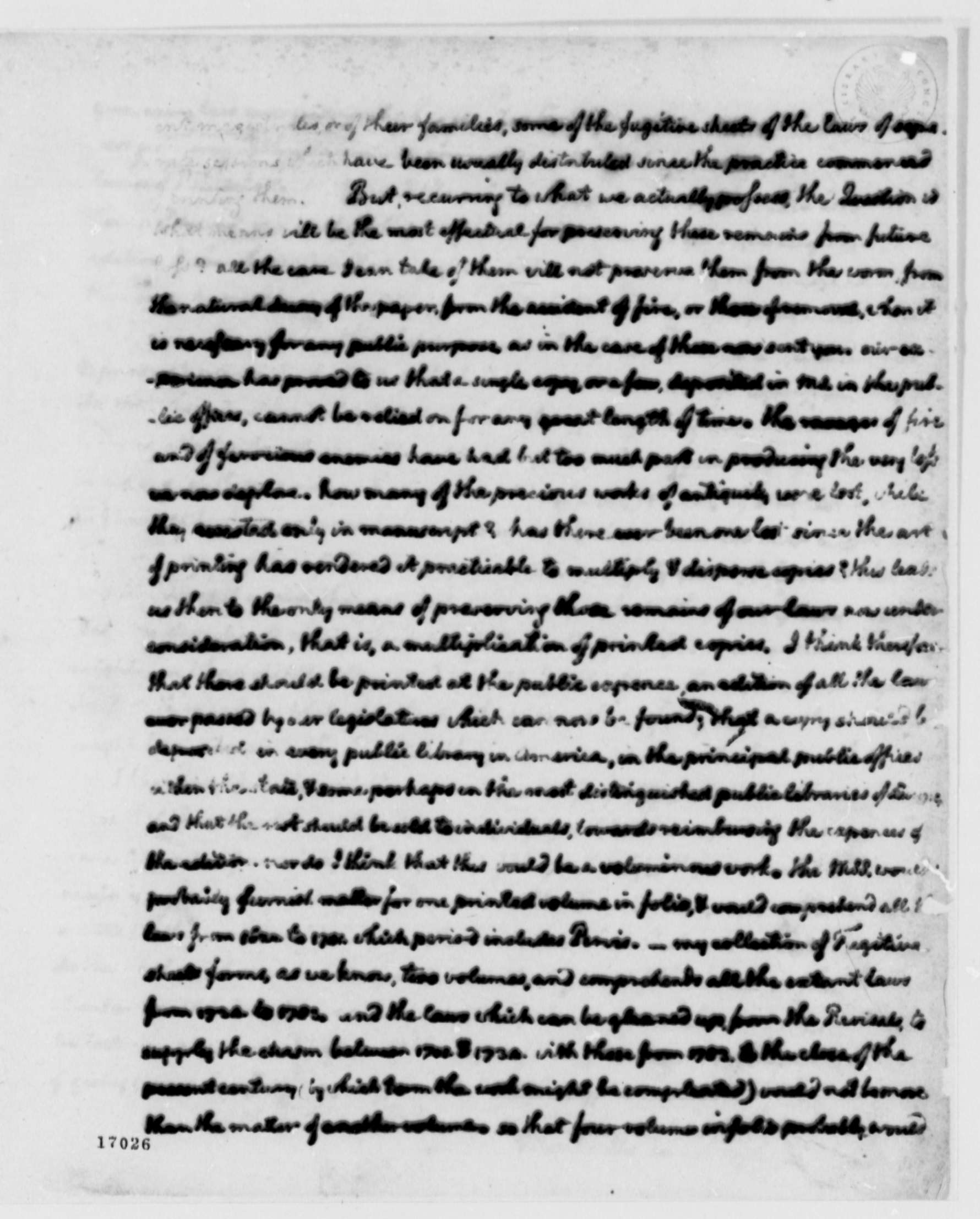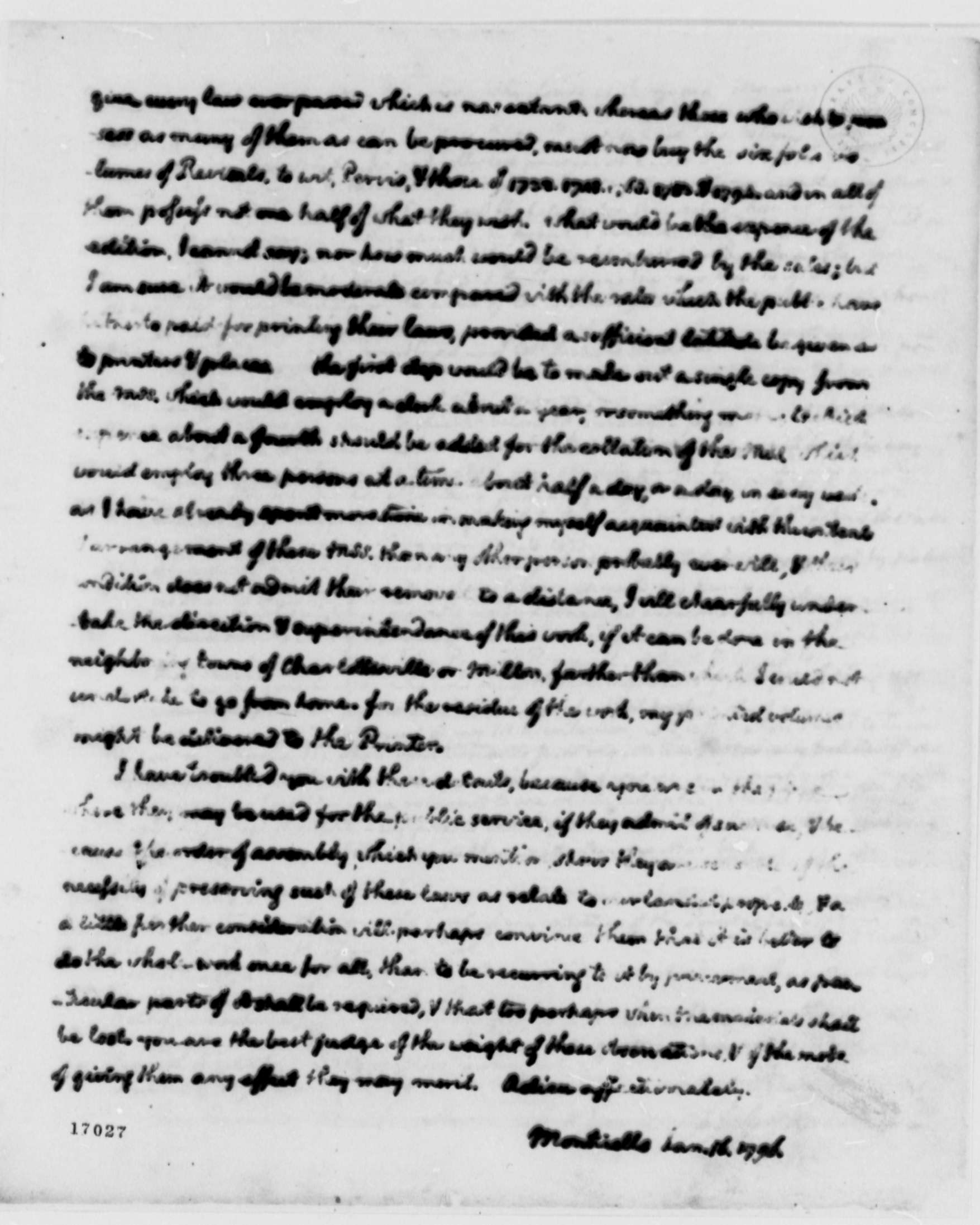Thomas Jefferson to Wythe, 16 January 1796
Jefferson produced multiple copies of this letter. The version below is Jefferson's press copy of the final letter that he sent to Wythe. This copy does not include the list of Virginia laws that he mentions. Jefferson sent a draft of this letter to James Madison, see Thomas Jefferson to Wythe, 16 January 1796 (Madison Draft with List of Virginia Laws), which includes the full list. Jefferson kept a press copy of that draft for himself, see Thomas Jefferson to Wythe, 16 January 1796 (Copy of Madison Draft).

"Thomas Jefferson to Wythe, 16 January 1796, pg 1." Image from the Library of Congress, The Thomas Jefferson Papers.
Letter text
Page 1
In my letter which accompanied the box containing my collection of Printed laws, I promised to send you by post a statement of the contents of the box. on taking up the subject I found it better to take a more general review of the whole of the laws I possess, as well Manuscript as Printed, as also of those which I do not possess, & suppose to be no longer extant. this general view you will have in the enclosed paper, whereof the articles stated to be Printed constitute the contents of the box I sent you. those in MS. were not sent, because not supposed to have been within your view, & because some of them will not bear removal, being so rotten, that, on turning over a leaf it sometimes falls into powder. these I preserve by wrapping & sewing them up in oiled cloth, so that neither air nor moisture can have access to them. very early in the course of my researches into the laws of Virginia, I observed that many of them were already lost, and many more on the point of being lost, as existing only in single copies in the hands of careful or curious individuals, on whose deaths they would probably be used for waste paper. I set myself therefore to work, to collect all which were then existing, in order that when the day should come in which the public should advert to the magnitude of their loss in these precious monuments of our property, & our history, a part of their regret might be spared by information that a portion has been saved from the wreck, which is worthy of their attention & preservation. in searching after these remains, I spared neither time, trouble, nor expence; & am of opinion that scarcely any law escaped me, which was in being as late as the year 1770 in the middle or Southern parts of the state. in the Northern parts, perhaps something might still be found. in the clerk's office in the antient counties some of those MS. copies of the laws may possibly still exist, which used to be furnished at the public expence to every county, before the use of the Press was introduced; & in the same places, and in the hands of antient
Page 2

"Thomas Jefferson to Wythe, 16 January 1796, pg 2." Image from the Library of Congress, The Thomas Jefferson Papers.
magistrates or of their families, some of the fugitive sheets of the laws of separate sessions, which have been usually distributed since the practice commenced of printing them. But, recurring to what we actually possess, the Question is, what means will be the most effectual for preserving these remains from future loss? all the care I can take of them will not preserve them from the worm, from the natural decay of the paper, from the accident of fire, or those of removal, when it is necessary for any public purposes, as in the case of those now sent you. our experience has proved to us that a single copy, or a few, deposited in MS. in the public offices, cannot be relied on for any great length of time. the ravages of fire and of ferocious enemies have had but too much part in producing the very loss we now deplore. how many of the precious works of antiquity were lost, while they existed only in manuscript? has there ever been one lost since the art of printing has rendered it practicable to multiply & disperse copies? this leads us then to the only means of preserving those remains of our laws now under consideration, that is, a multiplication of printed copies. I think therefore that there should be printed at the public expence, an edition of all the laws ever passed by our legislatures which can now be found; that a copy should be deposited in every public library in America, in the principal public offices within the state, & some perhaps in the most distinguished public libraries of Europe, and that the rest should be sold to individuals, towards reimbursing the expences of the edition. nor do I think that this would be a voluminous work. the MSS. would probably furnish matter for one printed volume in folio, & would comprehend all the laws from 1624. to 1701. which period includes Pervis. – my collection of Fugitive sheets forms, as we know, two volumes, and comprehends all the extant laws from 1734. to 1783. and the laws which can be gleaned up, from the Revisals, to supply the chasm between 1701. & 1734. with those from 1783. to the close of the present century, (by which term the work might be compleated) would not be more than the matter of another volume. so that four volumes in folio, probably would
Page 3

"Thomas Jefferson to Wythe, 16 January 1796, pg 3." Image from the Library of Congress, The Thomas Jefferson Papers.
give every law ever passed which is now extant: whereas those who wish to possess as many of them as can be procured, must now buy the six folio volumes of Revisals, to wit, Purvis & those of 1732. 1748. 1768. 1783. & 1794. and in all of them possess not one half of what they wish. what would be the expence of the edition, I cannot say, nor how much would be reimbursed by the sales; but I am sure it would be moderate compared with the rates which the public have hitherto paid for printing their laws, provided a sufficient latitude be given as to printers & places. the first step would be to make out a single copy for the MSS. which would employ a clerk about a year or something more, to which expence about a fourth should be added for the collation of the MSS. which would employ three persons at a time about half a day, or a day in every week. as I have already spent more time in making myself acquainted with the contents & arrangement of these MSS. than any other person probably ever will, & their condition does not admit their removal to a distance, I will chearfully undertake the direction & superintendence of this work, if it can be done in the neighboring towns of Charlottesville or Milton, farther than which I could not undertake to go from home. for the residue of the work, my printed volumes might be delivered to the Printer.
I have troubled you with these details, because you are in the place where they may be used for the public service, if they admit of such use, & because the order of assembly, which you mention, shews they are sensible of the necessity of preserving such of these laws as relate to our landed property, and a little further consideration will perhaps convince them that it is better to do the whole work once for all, than to be recurring to it by piece-meal, as particular parts of it shall be required, & that too perhaps when the materials shall be lost. you are the best judge of the weight of these observations, & of the mode of giving them any effect they may merit. Adieu affectionately.
Monticello jan. 16. 1796.